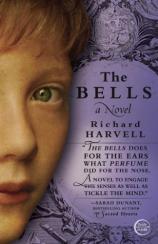The Bells
Review
The Bells
Richard Harvell's debut novel, THE BELLS, is set in 18th-century Europe and tells the story of a gifted opera singer, Moses Froben, whose extraordinary musical abilities are both a gift and a curse. Music shapes Moses's life, raising him to the heights of public acclaim while crushing his chances of finding love and leading a normal life.
Harvell has put together a solid debut effort, a romantic tragedy that is engaging, informative and operatic in scope.
Born in a small Swiss village notable only for its possession of the loudest church bells in the world, Moses's life is as operatic as the songs he would later sing. His childhood is hermetic in its isolation, since he lives in the church belfry with his "idiot" deaf-mute mother. His mother is the tower's bell-ringer, as she is the only person in town who could tolerate the clamor of the bells. Moses's father is the cruel village priest, a man who only tolerated Moses because he believed him to be a deaf-mute like his mother. Moses, though, turns out to be neither deaf nor mute, but a boy whose upbringing in the shadow of the bells had in fact bestowed preternaturally sensitive hearing upon him.
When Moses is thrown into a river to drown by his father, two monks rescue the boy. The monks --- a pair of gay lovers whom their abbot despises --- take Moses back into the abbey with them to live there in secret. Soon enough, the boy and his beautiful voice are both discovered. The abbey's choirmaster becomes so besotted with his voice that he has Moses forcibly castrated in secret so that his voice will never change. While a castrated musician might gain admiration as a "musico" (angel) in 18th-century Italy and other parts of Europe, the practice still remained despised in Switzerland at that time, forcing Moses to carry his shame and pain in secret.
When Moses finds love, he contrives to hide his secret from his lover, who eventually is forced to marry another man. The abbot, who despises castration as an abomination in God's eyes, permits the musician to continue to live in the abbey, on the condition that he will never sing again. The pair of monks who have served as loving parental figures to the musical genius are forced out of the abbey, leaving Moses all alone, now bereft of even the solace of his music. But here the young hero rebounds, departing for Vienna in search of his beloved and his friends, and finding acclaim, love and redemption.
Author Richard Harvell was inspired by German composer Christoph Willibald Gluck's opera, "Orpheus and Eurydice," based on the Greek myth of Orpheus, the legendary musician who charmed Hades in a futile bid to bring his dead wife back to life. The Gluck opera was first performed in 1762 with the lead being sung by the famous castrato Gaetano Guadagni, who makes an appearance in THE BELLS as a mentor to Moses. The novel gains its rich historical context from the fact that many of the book's characters such as Gluck, Gaetano and abbot Coelestin Gugger von Staudach are based on people, places and events plucked from real life.
Harvell has put together a solid debut effort, a romantic tragedy that is engaging, informative and operatic in scope. One of the book's great strengths is its ability to find words to convey the experience of listening to music with all of one's being, and being transported by it. At its heart, THE BELLS is an ode to music.
Reviewed by Usha Rao on July 4, 2011
The Bells
- Publication Date: June 28, 2011
- Genres: Fiction, Historical Fiction
- Paperback: 384 pages
- Publisher: Broadway
- ISBN-10: 0307590534
- ISBN-13: 9780307590534





